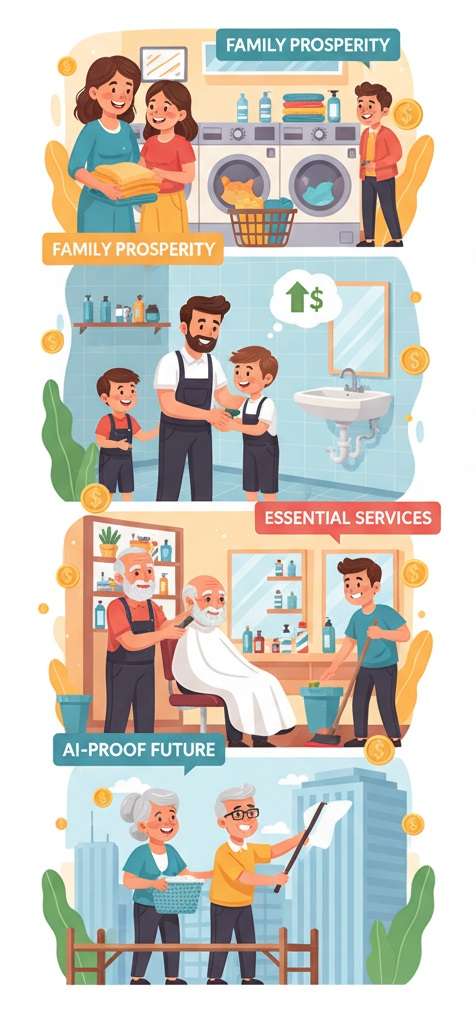- 15 September 2025
- No Comment
- 764
Which Simple Business Can Still Make You Rich Without AI

Everyone’s chasing AI, but the real wealth might still be hiding in old-fashioned businesses we take for granted.
Nowadays, everywhere we turn, all we hear is AI, AI, AI. Every day brings a new tool, a new innovation, and people rush to keep up with these rapid advancements. Even highly skilled professionals worry that they might soon be replaced by machines if they don’t constantly upgrade their skills. But the reality is, not everyone has the chance to reinvent themselves, sometimes because of age, resources, or simply lack of interest in tech.
But there are still plenty of businesses and skills that AI cannot replace anytime soon, maybe never. These are real-world, hands-on opportunities that allow ordinary people to build wealth, grow steadily, and sleep soundly without the fear of being “taken over” by technology.
In fact, have you ever noticed how some of the wealthiest people around us didn’t build fancy tech startups or invent the next AI tool? Instead, they run those boring businesses that most of us overlooked, like laundromats, plumbing services, or even tow trucks/cars. While AI is reshaping industries, these old-fashioned, people-driven businesses continue to create millionaires in silence.
What makes them so powerful is simple: they solve real, physical, everyday problems that apps or robots can’t fix. And surprisingly, many of these opportunities are within reach for ordinary people who are willing to work hard, stay consistent, and grow step by step.
In this article, we’ll explore AI-proof businesses that have already created countless millionaires. We’ll look at why they’re profitable, what challenges they carry, and why they’ll remain essential no matter how far technology advances.
1. Car Wash & Detailing Services – Everyday Luxury
Why it’s profitable:
People love clean cars. Automated washes exist, but premium detailing (polishing, waxing, interior cleaning) brings high profit margins. Repeat customers and fleet contracts (taxis, delivery vans) add reliable revenue.
Why AI can’t replace it:
Machines can rinse cars, but attention-to-detail cleaning, polishing leather seats or restoring paint, is human craftsmanship.
The hidden downsides:
Location is everything. In rainy or snowy seasons, demand may dip. Labor turnover is common, and competition can be stiff. But well-run operations scale beautifully.
2. Landscaping and Lawn Care – Green Profits in Every Yard
Why it’s profitable:
From mowing lawns to designing outdoor spaces, landscaping is always in demand. Homeowners, corporate offices, and municipalities spend billions annually on maintenance. Successful landscaping firms grow into million-dollar enterprises.
Why AI can’t replace it:
Robotic mowers exist, but custom designs, seasonal planting, and aesthetic decisions need human judgment. Customers also prefer a human touch in discussing their property’s look.
The hidden downsides:
It’s seasonal in many areas, requiring planning for slow months. Weather can also disrupt schedules. But with strong contracts and expansion, it’s a steady earner.
3. Senior Care Services – A Growing Goldmine
Why it’s profitable:
As populations age, the demand for non-medical senior care, companionship, daily assistance, transportation, is booming. Families pay generously for trusted caregivers.
Why AI can’t replace it:
AI robots may assist with reminders, but human empathy and presence can’t be automated. Seniors crave connection and trust, which only people provide.
The hidden downsides:
Staffing is challenging, and regulations vary. Emotional strain is also real. Still, with demand skyrocketing, this industry is a future-proof millionaire maker.
4. Beauty Salons & Stylists – The Art of Human Touch
Why it’s profitable:
From hair coloring to bridal makeup, beauty services are not just about appearance, they’re about confidence. People are willing to spend generously to look and feel good, making beauty salons and freelance stylists highly profitable. A loyal client base can turn a small salon into a millionaire business over time.
Why AI can’t replace it:
AI can suggest hairstyles or makeup trends, but the hands-on artistry, creativity, and emotional connection between stylist and client are uniquely human. No machine can replace the trust built when someone touches your face or hair.
The hidden downsides:
Trends change quickly, and professionals must constantly upgrade their skills. Competition is intense, and income can fluctuate if clients move on. Setting up a salon also requires upfront investment in space, equipment, and branding. Still, it’s an industry that thrives on personal connection, something AI simply cannot deliver.
5. Barber Shops – Timeless Business, Steady Cash
Why it’s profitable:
No matter how advanced the world gets, men will always need haircuts, shaves, and grooming. A well-located barber shop can bring in steady, predictable income week after week. Many barbers grow from single-chair shops into full-fledged grooming studios, multiplying their earnings and building generational wealth.
Why AI can’t replace it:
Sure, there are haircutting robots in experimental labs, but no machine can match the precision, conversation, and trust people expect from their barber. Grooming is as much about personal connection as it is about scissors.
The hidden downsides:
The job requires long hours on your feet, and income depends heavily on customer loyalty. In crowded areas, price wars can hurt profits. But with strong branding and excellent service, barbers can carve out a niche that stays profitable for decades.
6. Rental Equipment Business – Tools That Print Money
Why it’s profitable:
Not everyone can afford to buy expensive equipment like air compressors, power tools, or construction machinery. Renting them out is a smart way to generate recurring income. Builders, DIY enthusiasts, and contractors often rent instead of buying. Over time, the same machine makes back its cost many times over.
Why AI can’t replace it:
AI can help track rentals or manage inventory, but the physical act of using tools on a job site is human work. You can’t outsource drilling, sawing, or paving to AI, someone needs the equipment in hand.
The hidden downsides:
Equipment needs regular maintenance. Mishandling by renters can damage items, and theft is always a risk. Plus, this business works best in growing areas with active construction and home improvement demand.
7. Plumbing, Electricians, and HVAC Repair – The “Forever in Demand” Services
Why it’s profitable:
Plumbers, electricians, and HVAC technicians solve urgent problems. Burst pipes, power failures, or broken air conditioners don’t wait, customers pay quickly and often without bargaining. Skilled service providers can charge premium rates, and expanding into a team-based business creates millionaire opportunities.
Why AI can’t replace it:
Fixing a leaking pipe or rewiring a home requires hands-on labor and problem-solving in messy, unpredictable environments. AI can guide, but it can’t crawl under a sink.
The hidden downsides:
Labor shortages are a challenge. Finding skilled workers and training them takes time. The job can be physically demanding, and seasonality (like summer AC spikes) impacts workload.
8. Emergency Tow Truck Business – Paid in Desperation
Why it’s profitable:
Car breakdowns, accidents, and flat tires happen every day. When people are stranded, they don’t argue much about prices, they need help fast. Tow truck businesses earn well from both roadside emergencies and partnerships with insurance companies or repair shops.
Why AI can’t replace it:
Even self-driving cars will break down. Someone must physically arrive, lift the car, and transport it. AI dispatch systems may streamline calls, but the actual service stays human-powered.
The hidden downsides:
It’s a tough lifestyle. Calls can come at 2 AM in bad weather. Trucks need expensive upkeep, and insurance costs are high. Yet, for those willing to deal with the grind, it’s an income powerhouse.
9. Laundromat Business – The “Silent Millionaire Maker”
Why it’s profitable:
Laundromats may sound boring, but they’re cash machines. People will always need clean clothes. Unlike fashion trends, laundry never goes out of style. Once set up, a laundromat requires relatively low staffing. Customers pay upfront, machines work tirelessly, and revenue can be surprisingly high in busy neighborhoods. Many laundromat owners quietly earn six to seven figures annually.
Why AI can’t replace it:
You can’t send your laundry to the cloud. AI can schedule pickups or manage bookings, but washing, drying, and folding clothes requires physical space, machines, and service staff.
The hidden downsides:
Starting a laundromat is capital-heavy. Commercial machines, water systems, and real estate aren’t cheap. Maintenance costs are ongoing, and competition can be fierce in city areas. But once established, it’s one of the most stable and recession-proof businesses you’ll find.
10. Waste Management – Turning Trash into Treasure
Why it’s profitable:
Trash collection isn’t glamorous, but it’s gold. Cities and businesses pay big money to have waste hauled away. Recycling and eco-friendly initiatives are making this industry even more lucrative. Many small operators grow into regional giants worth millions.
Why AI can’t replace it:
Garbage trucks, recycling centers, and disposal work are all physical. Technology can improve efficiency, but AI can’t pick up your trash can.
The hidden downsides:
Startup costs (trucks, permits, disposal fees) are steep. Plus, dealing with waste isn’t for everyone. But for those who get in, it’s a stable, scalable business that few think about but everyone needs.
11. Window Cleaning Business – Clear Views, Clear Profits
Why it’s profitable:
Commercial buildings and high-rise apartments need window cleaning regularly. Many property managers sign long-term contracts, providing steady income. A small operation can grow quickly, and specialty services (like high-rise work) charge premium rates.
Why AI can’t replace it:
Drones or robots may help in the future, but for now, human precision and safety control are unmatched. Property managers still prefer skilled workers for liability reasons.
The hidden downsides:
It’s physically risky. Weather can delay work, and insurance costs are significant. Still, for many entrepreneurs, it’s an overlooked path to wealth.
The Bigger Picture: Ordinary People, Extraordinary Wealth
What do all these businesses have in common?
- They solve unavoidable, everyday problems.
- They require physical presence that AI cannot replace.
- They can be scaled — one truck, one machine, or one contract at a time.
Yes, each comes with challenges: high startup costs, maintenance, staffing headaches, or tough hours. But these aren’t deal-breakers — they’re the reality of building real wealth.
While the world rushes toward AI and flashy tech startups, smart entrepreneurs quietly build fortune in laundromats, plumbing, waste management, and window cleaning. These businesses prove that you don’t need to be a coder or an AI expert to become a millionaire.
Sometimes, all you need is the courage to pick up the kind of business most people overlook.
Read more: Big Brands in Trouble: Why Shoppers Are Choosing Store Brand
Something big is happening when it comes to the way we shop. You might not notice it at first, but take a look in your grocery cart. Maybe instead of grabbing any big-brand pasta like Barilla, you’re reaching for the store brand. Or you’re picking up Great Value detergent instead of Tide.
This isn’t just about saving a few bucks. It’s a bigger shift. People aren’t as loyal to big-name brands anymore. And if companies don’t pay attention, they could go the way of Kodak or Blockbuster, remember them?



